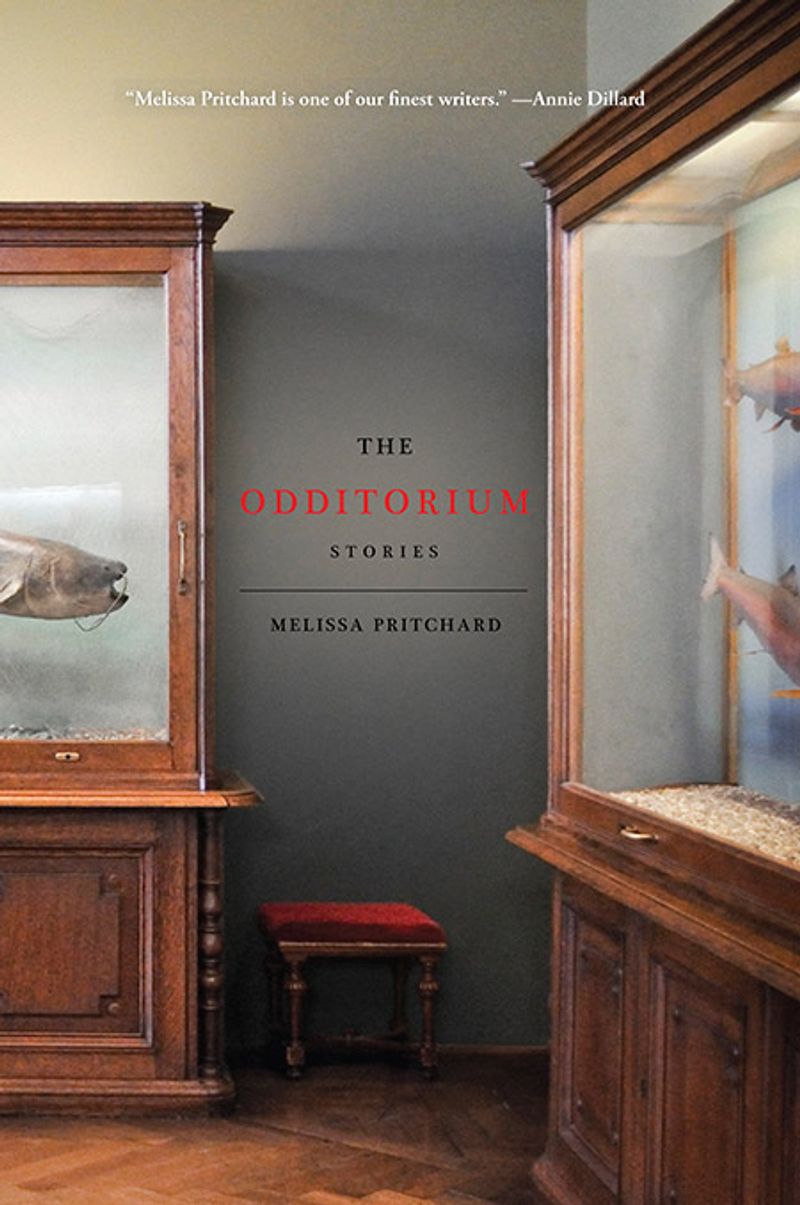The Odditorium
In each of these eight genre-bending tales, Melissa Pritchard overturns the conventions of mysteries, westerns, gothic horror, and historical fiction to capture surprising and often shocking aspects of her characters’ lives.
In one story, Pritchard creates a pastiche of historical facts, songs, and tall tales, contrasting the famed figures of Buffalo Bill’s Wild West Show, including Annie Oakley and Sitting Bull, with the real, genocidal history of the American West. Other stories are inspired by the mysterious life of Kaspar Hauser, a haunted Victorian Hospital where the wounded of D-Day are taken during WWII, the courtyard where Edgar Allan Poe played as a child, and the story of Robert LeRoy Ripley, of “Ripley’s Believe It or Not,” and his beguiling “odditoriums” as seen from his life-long fact checker.
New Mexico-Arizona Book Award Finalist
O, The Oprah Magazine “Title to Pick Up Now” & Oprah.com Book of the Week
San Francisco Chronicle Best Book of the Year
Library Journal Best Stories Collection of the Year
Image: Art, Faith Mystery Top Ten of the Year
Largehearted Boy Favorite Short Story Collection of the Year

Ebook
- ISBN
- 9781934137475
Paperback
- ISBN
- 9781934137376
Tune in to the PBS American Experience documentary Ripley: Believe It or Notto hear Melissa Pritchard discuss Robert LeRoy Ripley, whose strange and wonderful world she researched for the title story of The Odditorium.
Melissa Pritchard talks about The Odditorium and the ways in which faith intersects with creativity with IMAGE: Art, Faith, Mystery and discusses how she brings passion and imagination to historical fiction with Kirkus Reviews and ASU News.
Melissa Pritchard is the author of twelve books, including the novels Flight of the Wild Swan and Palmerino, the short story collection The Odditorium, and the essay collection A Solemn Pleasure: To Imagine, Witness, and Write. Among other honors, she has received the Flannery O’Connor Award, Janet Heidinger Kafka Prize, and Carl Sandburg Literary Award as well as fellowships from the National Endowment for the Arts and the Carson McCullers Center. Emeritus Professor of English and Women’s Studies at Arizona State University, she is the fiction editor for Image journal and lives in Columbus, Georgia.
visit author page »Praise for The Odditorium
Melissa Pritchard’s aptly titled The Odditorium considers the inner lives of the strange, the damaged and the forgotten . . . with its zest for the macabre and its time-spanning imaginative appetite . . . the singularity of her narrators remains indelible [and] shows that fiction still has the ability to shock and surprise.
Pritchard’s best stories are ambitious, lush and even thrilling. She takes risks, different risks in different stories. Can she write a segment in the form of a comedic Shakespearean dialogue? She can. Does a story evolve into epistolary form? It does. Will she be able to build a story around the format of an old newspaper feature? She will. Can she do it all with poetic, vivid prose? With one hand tied behind her back. Is Melissa Pritchard someone whose short fiction should be well known? Do you even have to ask?
Any great writer does many things at once, of course, but most lead with a particular strength. And then there is Pritchard, who simply turns all the dials up to eleven. In [The Odditorium], more than in previous works, history gives her the best playing field for her considerable energies and produces some of her most moving and satisfying stories to date.
The Odditorium is a stunning read, dense and intricately woven, masterfully assembled and sensitively rendered. Pritchard’s text somehow comes across as at once delicate and forceful. Her interest in history—literary and cultural—in this collection adds a depth of focus and an attention to nuance that is truly arresting.
A master of the form . . . [Pritchard’s] fiction, like the best Gothic classics, makes us feel like we are traveling on a pleasant, meandering river—until we round the last bend and find ourselves on the edge of a waterfall, looking down into the darkest depths of the human soul.
Award-winning author Pritchard crosses genres to create energized, fiercely atmospheric tales about holy fools, haunted hospitals, Annie Oakley, and more.
— Barbara Hoffert, Library Journal Best Stories Collections of the Year citation
Reading Melissa Pritchard’s short-story collection The Odditorium is a bit like peering into a Wunderkammer, one of those magical cabinets where the rich and adventurous used to display their treasures. The beautiful, the grotesque. The odd, the charming . . . Pritchard uses fiction to bring new life to these figures—some famous and mythologized, and others not—blending the historical and the fantastical to create a collection of great charisma.
The beauty of Pritchard’s short story collection begins with the cover design, which depicts the corner of what looks like a natural history museum with large, frightening fish. Inside, there’s an equally unusual collection of tales, most of them taking the reader to distant lands, distant times.
The breadth of [Melissa Pritchard’s] scholarship and imagination, and her accomplished prose left me dazzled. . . . Hers are stories that educate you. . . . If there is risk in being imaginative and stepping outside of certain norms for publishers, then Ms. Pritchard and all of her editors are risk-takers and her readers are beneficiaries.
Melissa Pritchard’s The Odditorium is as strange, wonderful, and (most important) as much fun as anything good old Robert LeRoy Ripley could ever have envisioned. Passionate, bold imaginings that illuminate the darkest, most precious reaches of our lives. Believe it: these stories are a gift.
— Pinckney Benedict, author of Miracle Boy
Melissa Pritchard has her GPS set to find the how it is—out there and in the heart—and she makes her way forward with her language on high alert. The prose is rhythmically astute, finely pitched, serving both imagination and witness.
— Sven Birkerts, author of The Gutenberg Elegies: The Fate of Reading in an Electronic Age and editor of AGNI
In this thrillingly protean collection of stories, Melissa Pritchard has done something profound. By imagining her way into historical moments and illuminating their shadows, she amplifies the music of history so we hear beautifully strange, wondrous notes we never knew were there. These stories resound with a fierce yet playful intelligence and a rare, magnificent generosity.
— Maud Casey, author of Genealogy
The Odditorium is a dazzling wonderment, its cast drawn from the far-flung corners of history and imagination, its language crystalline and high-voltage, its stories fearless and even visionary. Here is an irresistible curiosity cabinet of the famous, the infamous, the mysterious, the half-forgotten—conjured with prodigious empathy, wit, and energy by one of our finest writers. Melissa Pritchard is a treasure and this book is her glorious trove.
— Bradford Morrow, author of The Diviner’s Tale and The Uninnocent
Fueled by roofless imagination and fearless curiosity The Odditorium is a case study in how one writer’s wisdom and empathy transforms known facts of existence into something more than magic. Pritchard draws from the cold, deep well of myth, legend, and history to redefine what narrative can do. Each story is a lesson in compassion. Each story is nothing short of genius. Each story was written for you.
— Gina Ochsner, author of The Russian Dreambook of Color and Flight
No one is quite so brilliant at voicing the all-but-impossible-to-track interior lives of the most complex human beings as is Melissa Pritchard . . . there is so much energy and inventiveness! Her linguistic flexibility is stunning, comic and gravely substantial. At its heart is always the troubled, often confused but courageous and tenacious human heart.
— Brad Watson, author of Aliens in the Prime of Their Lives and The Heaven of Mercury

